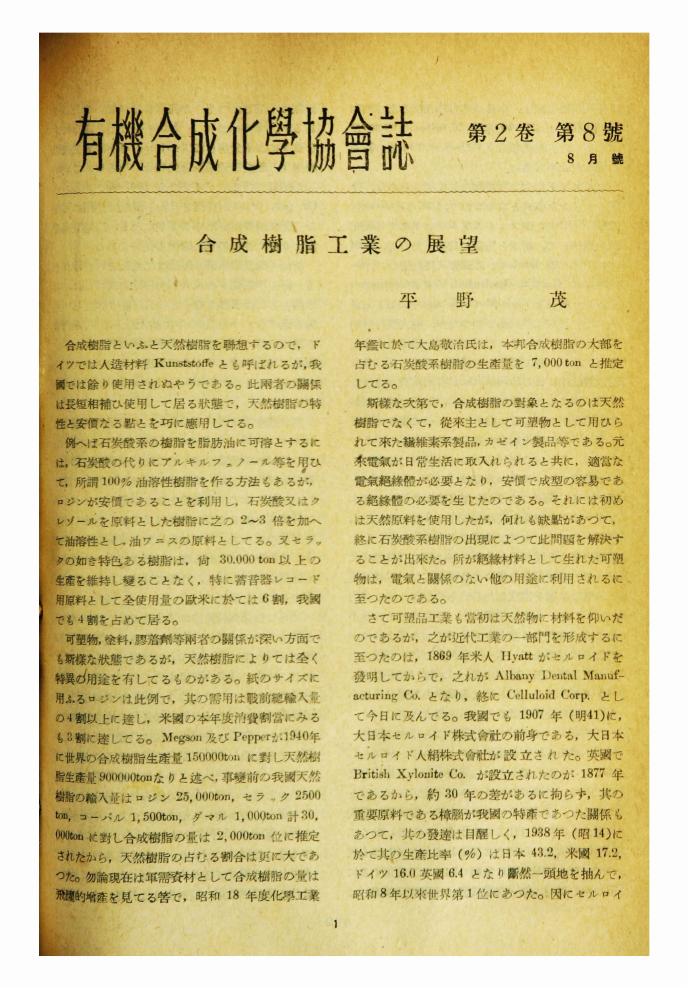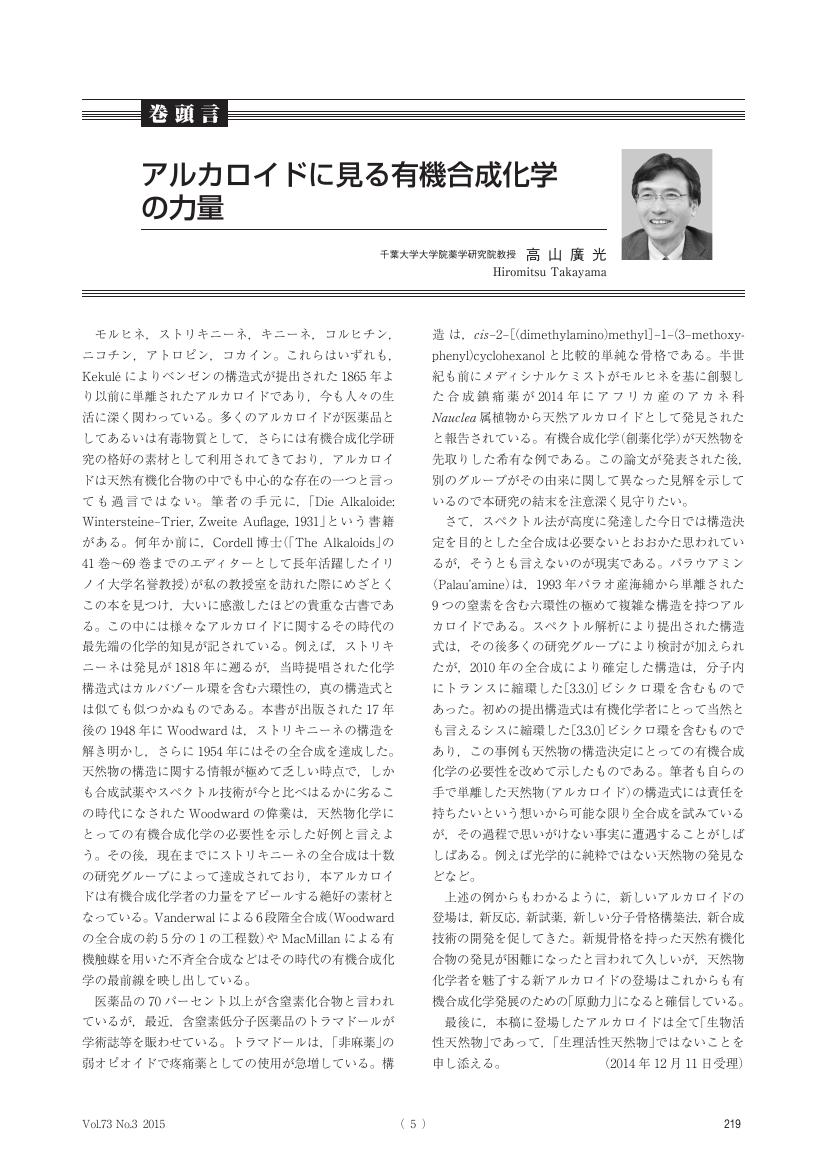1 0 0 0 OA 尿素樹脂・メラーミン樹脂
- 著者
- 長澤 不二男
- 出版者
- 公益社団法人 有機合成化学協会
- 雑誌
- 有機合成化学協会誌 (ISSN:00379980)
- 巻号頁・発行日
- vol.2, no.8, pp.489-497, 1944-08-01 (Released:2010-10-20)
- 参考文献数
- 35
1 0 0 0 OA 合成樹脂主業の展望
- 著者
- 平野 茂
- 出版者
- 公益社団法人 有機合成化学協会
- 雑誌
- 有機合成化学協会誌 (ISSN:00379980)
- 巻号頁・発行日
- vol.2, no.8, pp.481-488, 1944-08-01 (Released:2010-10-20)
1 0 0 0 OA 外部刺激による活性種の相互変換に基づくリビングラジカル/カチオン重合
- 著者
- 本間 千裕
- 出版者
- 公益社団法人 有機合成化学協会
- 雑誌
- 有機合成化学協会誌 (ISSN:00379980)
- 巻号頁・発行日
- vol.80, no.10, pp.952-953, 2022-10-01 (Released:2022-10-06)
- 参考文献数
- 4
The development of controlled polymerization such as RAFT polymerization has enabled the synthesis of macromolecules with well-defined structures. Recently, control over polymerization processes has been achieved through regulation of chain growth with various external stimuli. This review highlights the interconversion between living radical and cationic polymerization using external stimuli. Photochemical and electrochemical stimuli are effective to switch the polymerization mechanism and the monomer selectivity in situ.
1 0 0 0 OA 有機化学者としての心得
- 著者
- 国嶋 崇隆
- 出版者
- 公益社団法人 有機合成化学協会
- 雑誌
- 有機合成化学協会誌 (ISSN:00379980)
- 巻号頁・発行日
- vol.80, no.10, pp.897, 2022-10-01 (Released:2022-10-06)
1 0 0 0 OA グッとくる研究
- 著者
- 山田 陽一
- 出版者
- 公益社団法人 有機合成化学協会
- 雑誌
- 有機合成化学協会誌 (ISSN:00379980)
- 巻号頁・発行日
- vol.80, no.10, pp.954-956, 2022-10-01 (Released:2022-10-06)
- 参考文献数
- 8
1 0 0 0 OA ライブイメージング Brook転位 トランス効果 抗凝固薬(抗血栓薬)
- 著者
- 大坪 忠宗 松谷 裕二 小室 貴士 飛田 博実 道田 誠
- 出版者
- 公益社団法人 有機合成化学協会
- 雑誌
- 有機合成化学協会誌 (ISSN:00379980)
- 巻号頁・発行日
- vol.76, no.12, pp.1363, 2018-12-01 (Released:2018-12-12)
1 0 0 0 リチウムアミド
- 著者
- 岡野 一哉
- 出版者
- 公益社団法人 有機合成化学協会
- 雑誌
- 有機合成化学協会誌 (ISSN:00379980)
- 巻号頁・発行日
- vol.78, no.12, pp.1197-1199, 2020-12-01 (Released:2020-12-08)
- 参考文献数
- 12
1 0 0 0 OA 反応との対峙
- 著者
- 上西 潤一
- 出版者
- 公益社団法人 有機合成化学協会
- 雑誌
- 有機合成化学協会誌 (ISSN:00379980)
- 巻号頁・発行日
- vol.73, no.12, pp.1191, 2015-12-01 (Released:2016-01-19)
1 0 0 0 OA 十字路
- 著者
- 吉良 満夫 海野 雅史 当麻 博文 百足 勉 河内 卓彌
- 出版者
- 公益社団法人 有機合成化学協会
- 雑誌
- 有機合成化学協会誌 (ISSN:00379980)
- 巻号頁・発行日
- vol.62, no.2, pp.162, 2004-02-01 (Released:2009-11-13)
1 0 0 0 OA 生物有機化学研究から生物無機化学研究への展開で味わった幾つかの感動
- 著者
- 伊東 忍
- 出版者
- 公益社団法人 有機合成化学協会
- 雑誌
- 有機合成化学協会誌 (ISSN:00379980)
- 巻号頁・発行日
- vol.80, no.7, pp.697-700, 2022-07-01 (Released:2022-07-09)
- 参考文献数
- 20
1 0 0 0 OA CMC研究
- 著者
- 中村 耕治
- 出版者
- 公益社団法人 有機合成化学協会
- 雑誌
- 有機合成化学協会誌 (ISSN:00379980)
- 巻号頁・発行日
- vol.68, no.1, pp.1, 2010 (Released:2010-03-02)
1 0 0 0 OA 100年先を見据えた有機合成化学
- 著者
- 柴田 哲男
- 出版者
- 公益社団法人 有機合成化学協会
- 雑誌
- 有機合成化学協会誌 (ISSN:00379980)
- 巻号頁・発行日
- vol.79, no.3, pp.187, 2021-03-01 (Released:2021-03-10)
1 0 0 0 縮環π拡張(APEX)反応による多環芳香族化合物の精密合成
- 著者
- 伊藤 英人 松岡 和 矢野 裕太 柴田 万織 伊丹 健一郎
- 出版者
- 公益社団法人 有機合成化学協会
- 雑誌
- 有機合成化学協会誌 (ISSN:00379980)
- 巻号頁・発行日
- vol.78, no.7, pp.671-682, 2020-07-01 (Released:2020-07-09)
- 参考文献数
- 63
- 被引用文献数
- 1 1
Polycyclic aromatic compounds are recognized as highly important class of compounds in materials science due to their high utility as organic semiconductors and organic optoelectronic materials. In general, they can be obtained through the established π-extension methods from unfunctionalized aromatics, while the syntheses are often suffered from multi-step process including halogenation, coupling reaction, Diels-Alder reaction, aromatization and so on. Recently, we have established a novel synthetic concept “annulative π-extension (APEX)” which has the potential to have a tremendous impact on the fields of synthetic chemistry since it allows rapid access to fused aromatic systems from simple unfunctionalized aromatic compounds in a single step. Here we report our recent results of palladium-catalyzed APEX reactions for the synthesis of polycyclic aromatic hydrocarbons, polycyclic heteroaromatics, nanographenes and even graphene nanoribbons from readily available unfunctionalized aromatics.
1 0 0 0 OA マンガン触媒によるアルケンの選択的な脱水素シリル化反応
- 著者
- 関根 康平
- 出版者
- 公益社団法人 有機合成化学協会
- 雑誌
- 有機合成化学協会誌 (ISSN:00379980)
- 巻号頁・発行日
- vol.80, no.6, pp.595-596, 2022-06-01 (Released:2022-06-09)
- 参考文献数
- 10
Dehydrogenative silylation, which produces vinyl silanes, was generally regarded as a side reaction in hydrosilylation of alkenes. However, due to a utility of vinyl silanes, transition-metal catalyzed dehydrogenative silylations have been developed. This mini-review focuses on recent developments of manganese-catalyzed selective dehydrogenative silylation of alkenes.
1 0 0 0 ビニルトリフラートおよびその類縁体のラジカル反応
- 著者
- 川本 拓治 上村 明男
- 出版者
- 公益社団法人 有機合成化学協会
- 雑誌
- 有機合成化学協会誌 (ISSN:00379980)
- 巻号頁・発行日
- vol.80, no.6, pp.554-562, 2022-06-01 (Released:2022-06-09)
- 参考文献数
- 28
Vinyl triflates are valuable precursors for vinyl cations, vinyl carbenes, and electrophiles for transition-metal-catalyzed cross-coupling reactions. However, in these reactions, the trifluoromethyl group is not installed in the final products. The radical reactions of vinyl triflates were limited until our beginning. We initially achieved the synthesis of α-trifluoromethylated ketones from vinyl triflates using triethyl borane as a radical initiator. Since the reaction proceeds chemoselectivity toward the conjugated vinyl triflates, we achieved the chemo- and regio-selective trifluoromethylation of 1,3-bis(vinyl triflates). We developed one-pot trifluoromethylation from aryl alkynes with perfluoroalkanesulfonic acids in the presence of AIBN as a radical initiator. In addition, a crossover experiment and DFT calculations support that the reaction proceeds through an intermolecular pathway. The radical reaction of vinyl triflates in the presence of alkenes afforded γ-trifluoromethylated ketones. We also developed a one-pot triflation-trifluoromethylation-triflation of imines leading trifluoromethyl-substituted vinyl trifluoromethanesulfonic amides.
1 0 0 0 有機化学を駆使した効率的なプラスチックや生体分子の変換反応
- 著者
- 上村 明男
- 出版者
- 公益社団法人 有機合成化学協会
- 雑誌
- 有機合成化学協会誌 (ISSN:00379980)
- 巻号頁・発行日
- vol.80, no.6, pp.541-553, 2022-06-01 (Released:2022-06-09)
- 参考文献数
- 130
Plastics are indispensable material that supports our daily life. The amounts of their production and waste are increasing in every year, and their recycling is recognized as a key issue for sustainable development of the world. Plastics are carbon resources and should be recycled in a proper manner. Chemical recycling is a concept in which plastics are treated chemically to give monomer or related compounds that would serve further use. Although chemical recycling of plastics is an ideal way, it is still difficult to carry it out. In this account, we focus on the depolymerization reaction of several plastics, and show how basic knowledge and recent development of synthetic organic chemistry provide important idea and solution on this matter. Use of supercritical alcohols and ionic liquids offered new and valuable methods. We applied the methodology developed here to biomass conversion, and we show the results about this application.
1 0 0 0 OA アルカロイドに見る有機合成化学の力量
- 著者
- 高山 廣光
- 出版者
- 公益社団法人 有機合成化学協会
- 雑誌
- 有機合成化学協会誌 (ISSN:00379980)
- 巻号頁・発行日
- vol.73, no.3, pp.219, 2015 (Released:2015-04-21)
1 0 0 0 OA 合成醫藥の近況に就いて
- 著者
- 菅澤 重彦
- 出版者
- 公益社団法人 有機合成化学協会
- 雑誌
- 有機合成化学協会誌 (ISSN:00379980)
- 巻号頁・発行日
- vol.6, no.10-12, pp.136-142, 1949-02-01 (Released:2010-11-30)
1 0 0 0 OA 十字路
- 著者
- 伊藤 芳雄 寺島 孜郎 米田 徳彦 佐藤 幸蔵 松本 和子
- 出版者
- 公益社団法人 有機合成化学協会
- 雑誌
- 有機合成化学協会誌 (ISSN:00379980)
- 巻号頁・発行日
- vol.47, no.7, pp.671, 1989-07-01 (Released:2009-11-13)
1 0 0 0 グリニャール試薬,ターボ·グリニャール試薬
- 著者
- 岡野 一哉
- 出版者
- 公益社団法人 有機合成化学協会
- 雑誌
- 有機合成化学協会誌 (ISSN:00379980)
- 巻号頁・発行日
- vol.72, no.7, pp.836-839, 2014-07-01 (Released:2014-08-15)
- 参考文献数
- 21











